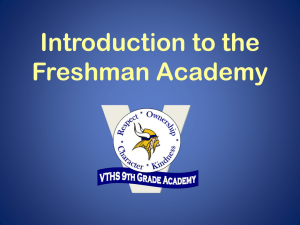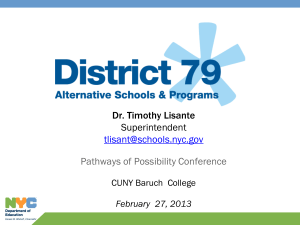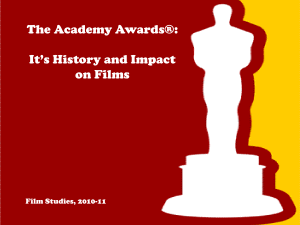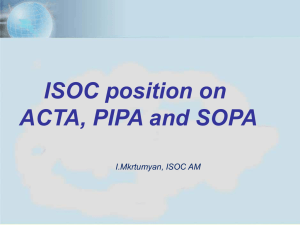Yerevan State Academy of Fine Arts
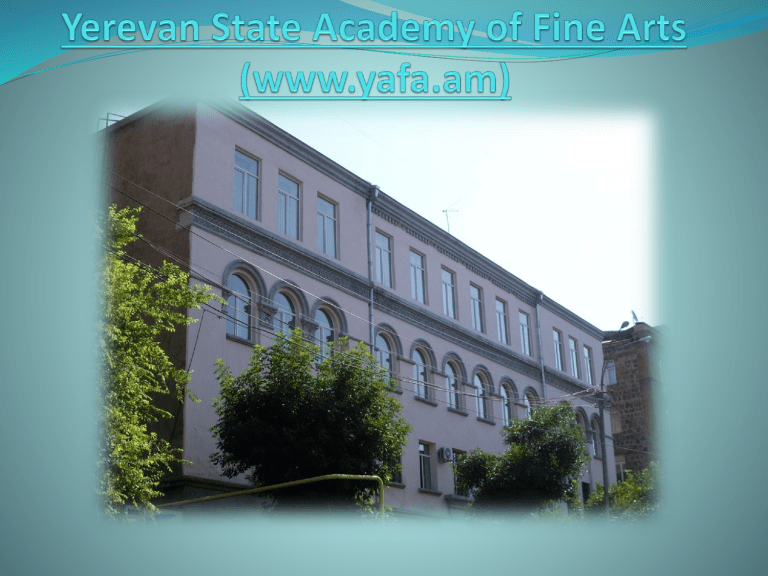
Yerevan State Academy of Fine Arts is
Celebrating its 65th Anniversary
In 1945 just a month after the end of the war the Institute of
Fine Arts was founded in Yerevan. It was something unique in ancient Armenian cultural life. Afterwards, the talented
Armenian students had an opportunity to get professional higher education within their homeland.
The graduates of that and consequent years, among whom were sculptors, artists, graphics, with the help of their bright and high art brought absolutely new quality standards to
Armenian national culture. Moreover, they were those graduates who laid foundation for the Union of Artists of
Armenia.
Through 1953-1994 the Institute of Fine Arts and the
Institute of Theatre have represented one Institution of higher education. In 1994 the Institute of Fine Arts became a separate entity, and in 2000 it was named as Yerevan State
Academy of Fine Arts.
Gyumri branch of the Academy was established in 1997, while Dilijan one was opened in 1999. H. Ghukassyan and Gh.
Ghazaryan were appointed as the directors of Gyumri and
Dilijan branches consequently.
Aram Isabekyan
YSAFA Rector, professor, RA Honored Art Worker
In 1994 artist, Honored Art Worker of the RoA, professor
Aram Isabekyan was appointed as the rector of Yerevan State
Institute of Fine Arts. A new building was acquired, and new laboratories and workshops were opened. It was of paramount importance for the Academy the establishment of exhibition hall, which was done by American Armenian benefactor Alber Boyajyan’s generous contribution. The event became a basis for enlivening the artistic life of the
Academy.
ректор Академии художеств Арам
ИСАБЕКЯН недавно побывали в Японии, куда были приглашены выдающимся буддийским мыслителем, писателем и педагогом Дайсаку ИКЕДОЙ, главой буддийского светского общества “Сока
Гоккай”.
Церемония вручения дипломов о присуждении звания почетного доктора
Академии художеств и почетного члена
Союза художников состоялась в главном зале Университета Сока.
Education
System of an estimation of knowledge of students of YSAFA
YSAFA launches a new grading system beginning the academic year of 2007-2008, which is formative assessment1 and differs significantly from the one, the summative one, applied before. The latter one stressed assessment of student knowledge only by the means of final exams whereas the formative one facilitates formation and development of student knowledge and competences throughout the whole semester and the final exam is one of its various components. The Chairs and instructors of the YSAFA bear the responsibility to determine which components to stress at a particular unit. The following can be the components upon which the final grade will be based:
• TENDANCE
• THE QUANTITY OF ASSIGNMENTS THROUGHOUT THE SEMESTER
• PARTICIPATION OF STUDENTS AT SEMINARS AND PRACTICAL TRAININGS
• TERM PAPERS AND PROJECTS
• FINAL EXAMS
• LITERATURE RESEARCH
• EXCLUSIVITY OF COMPOSITIONAL THOUGHT AND THE LIKE.
Education
System of an estimation of knowledge of students of YSAFA
Percentage
90%-100%
80%-89%
70%-79%
65%-69%
60%-64%
51%-59%
3.0
2.5
2.0
GPA
4.0
3.5
ECTS Grade
A
B
C
D
E
FX
Comment
Passing grades
Fail – some work required to pass
Less than 50% F
FAIL – considerable further work required
Education
Credit system of the organization of educational process in YSAFA
European Credit Transfer System
ECTS at the Yerevan State Academy of Fine Arts
Beginning the academic year of 2007-2008 YSAFA starts integration of the credit system1 namely the European
Credit Transfer System (ECTS). Currently, only the transfer element of the ECTS is applied, which means that transfer between the institutions becomes possible through the credits reflecting student workload.
The curricula is designed so that to comply with the credit system requirements and is divided into two major groups of units: required and electives, the sequence of which is determined according to each course prerequisites.
Credits are allocated to all the units according to their workload. At YSAFA the yearly workload comes to 1800 hours, which is equivalent to 60 ECTS credits. 1 ECTS credit equals to 30 hours of workload (contact hours, student independent work, internship and the like). For bachelor programs student weekly workload comes to 1.5 credits, which equals to 45 hours, 30 hours of which are intended for contact hours and 15 hours for student independent work. The semester workload comes to 30 credits and credits for one academic year come to 60.
Student learning outcomes and competences obtained throughout the period of study are assessed by the means of a final project (project, composition, thesis and the like) and its defense as well as a final qualification exam.
In order to get the BA degree students must meet the requirements of 240 credits for the whole program.
Student knowledge is assessed according to the formative assessment standards.
Education
Master program
YSAFA offers a three-cycle educational system: BA with duration of 4 years; MA with duration of two years and PhD with duration of three years.
Both Bachelor program and Master program offer two faculties:
History and Theory of Fine Arts and Designand Decorative Applied Artsthat respectively offer their own departments. The YSAFA Master program is designed for those having Bachelor degree, Master degree or for specialist diploma to deepen their knowledge or to gain Master degree qualification. Those studying in
Master program take a thoroughobservation of their specialty subjects. Master program offers admission in the following specialties:
Painting, Graphics, Sculpture, History and Theory of Fine Arts, Applied Fine Arts, Textile Design,
Design, Fin Arts Computer Projection
PhD program
PhD program offers admission in the following specialties: Theory and History of Fine Arts, Fine Arts,
Applied Arts and Design. PhD program length is 3 years for full-time studies, and part-time learning offers
4 years of study.
PhD program applicant must pass foreign language, computer sciences and computer proficiency tests established by the order of RA Ministry of Education and Science. In case of positive results he/she passes entrance examinations in the specialty subject "General Art History".
Faculties of Yerevan State Academy of Fine Arts
Yerevan State Academy of Fine Arts has two faculties:
· Fine Arts
· Design and Decorative Applied Arts
Nowadays successful applicants are admitted to the following eight Departments:
Painting, Sculpture, Graphics, Theory and History of Fine Arts, Design, Applied Arts,
Fashion, Computer Design. In 2009 the students for the first time have been admitted to the part-time teaching program of Fine Arts Department.
At present there are overall 764 registered students within the Academy, among who are 92 foreigners. Gyumri branch has 170 enrolled students, while Dilijan one has that of
34. Only through the recent two years 12 students of the Academy received gold, silver medals and encouraging diplomas in international contests.
From 120 enrolled lecturers 81 have scientific degrees and titles. Many of them have
Government awards, State rewards for high professionalism and highly artistic works.
Faculty of Fine Arts
• Painting Department
• Sculpture department
• Graphics Department
• History And Theory of Fine Arts Department
Faculty of Design and Decorative Applied Arts
• Design department
• Decorative Applied Arts Department
• Textile Design Department
• Computer Design Department
Chairs
Painting Chair
Sculpture Chair
Graphic Chair
Drawing Chair
Chair of Design
Chair of Decorative Applied Arts
History And Theory of Fine Arts Chair
Chair of Humanities
Joint Chair of Painting, Drawing and Sculpture
Gyumri branch of the Academy
Gyumri branch of the Academy was established in 1997.
H. Ghukasyan
Dean of Gyumri Branch
Departments: Painting, Graphics, Sculpture, History and Theory of Fine Arts, Textile Design,
Decorative Applied Arts.
Chaire of Painting
Chaire of Drawing
International Cooperation
Tempus
Trans European Mobility Program for University Studies
Partners from Ukraine, Russia, Moldova, Germany, Poland, Netherlands, France and Spain visited Armenia.
International Cooperation
Since April of 2007, one of the workshops of Cite International des
Art belongs to the foundation
"Academy of Fine Arts". The foundation obtained the workshop that would give an opportunity to
YSAFA students and professional artists to create and exhibit their works about two months in the centre of Paris.
CITE INTERNATIONALE DES ARTS
Limoges-Aubusson National School of Art
International Cooperation
THE VISIT OF THE STUDENTS OF
LIMOGES HIGH SCHOOL OF ART TO
YEREVAN STATE ACADEMY OF FINE
ARTS
According to the Bologna educational programme on February 2, 2009 after the primary negotiations a bilateral agreement of educational cooperation was signed between Yerevan State Academy of Fine
Arts and Limoges-Aubusson National
School of Art in France.
International Cooperation
THE STUDENTS OF YEREVAN STATE
ACADEMY OF FINE ARTS VISITED TO REIMS
Within the frames of the bilateral agreement signed between Yerevan State
Academy of Fine Arts and Reims School of
Art and Design in France, a first year student of Master's programme from design department of the Academy, Martin
Harutyunyan studied one semester of the academic years 2008-2009 in Reims and received the equivalent credits and marks
(on the basis of ECTS credit exchange of
Bologna programme). Martin Harutyunyan participated in the final workshop of the above mentioned institution. Some of his works are introduced bellow.
Reims School of Art & Design
THE STUDENTS OF YEREVAN STATE
ACADEMY OF FINE ARTS VISITED TO
REIMS
Reims School of Art & Design
International Cooperation
According to the statistics of 2009 Yerevan
State Academy of Fine Arts has educational agreements with higher educational
Institutions of several cities in France. One of the agreements signed in 2008 had its development. The collaboration is realized within the Bologna educational programme. YSAFA organized the first visit to Reims School of Art and Design, with whom the agreement was signed while the head of the above mentioned Institution
Clair Peyo visited YSAFA. From December
7-20 of 2008 within the frames of cooperation the third year and fourth year
9 students of YSAFA design and computer graphic departments realized the first stage of the cooperation with Reims School of
Art and Design. They participated in the projection and realization of a concrete task in Reims School. The return visit is expected in 2010.
International Cooperation
Baltic-Caucasus
From 23rd to 27 of November the Art Academy of Latvia in cooperation with UNESCO
National Committee of Latvia is implementing a project "Baltic-Caucasus -
Signs of Identity/Signs of Diversity".
The Cooperation project between Baltic and
Caucasus countries in arts is being implemented.
The Art Academy of Latvia in cooperation with
National UNESCO Committee of Latvia has started the cooperation project of Baltic and
Caucasus countries "Signs of Identity / Signs of
Diversity".
Within 23rd and 27th of November at the Art
Academy of Latvia a creative workshop - project will happen with 15 art students and 7 lecturers participating from 7 countries: Armenia - Martin
Harutyunyan, Sofya Galustyan and lecturer Avetik
Avetisyan.
International Cooperation
30 Sep 2005
Department of Advertising Photography and Graphic
Design
30 Sep 2005
Department of Animation and Audiovisual Arts
22 Apr 2009
Department of Fashion and Shoe Design
30 Sep 2005
Department of Marketing Communications
22 Apr 2009
Department of Theoretical Studies
30 Sep 2005
Department of Visual Arts
30 May 2008
Communication Agency
International Cooperation
YAFA has an already established cooperation with ISMA and AAL.
The Art Academy of Latvia (the AAL)
• Faculty of Visual Arts:
- Department of Painting;
- Department of Graphics;
- Department of Textile;
- Department of Drawing;
• Faculty of Visual Plastic Arts:
- Department of Sculpture;
- Department of Ceramics;
- Department of Glass Art;
- Department of Fashion Design;
• Faculty of Design;
- Department of Functional Design;
- Department of Metal Design;
- Department of Environment Art;
• Faculty of Audio-Visual Media:
- Department of Visual Communication;
- Department of Stage Design
• Faculty of history and Theory of Art:
- Department of History and Theory of Art and Culture;
- Department of Restoration;
- Department of Humanities.
The Department prepares specialists with professional higher education in accordance with two accredited study programmes:
• Second level Professional Higher Education
Programme “Business Administration”, specialization “Culture Management” (awarded qualification – “Business Administrator”)
• First level Professional Higher Education
Programme, specializations “Interior Design” and “Graphic Design” (awarded qualification –
“Environment Designer”).
International Cooperation
ISMA
"Culture Management”.
Study and academic work of the academic staff of the programme.
“Setting the goals of cultural activities, educational process of society, requirements imposed by society to cultural activities”, “Town holidays as urban marketing tool”, “The forms of organization of corporate events”,
“Development and trends in the organization of festivals and celebrations”, “Development of the Industry of conferences”, “ The strategy of funding of culture”.
„Environment Design”.
Study and academic work of the academic staff of the programme.
Methodical materials and visual aids have been worked out for the following study courses: Painting,
Drawing, Fundamentals of Interior Design, Advertising Technologies and Material Science, Interior Design,
Colour, Fundamentals of Graphics and Font Design, Painting on Glass, Fundamentals of Architecture.
Methodical guidelines for the organization of practical training, requirements and methodical recommendations for the elaboration of qualification paper were developed.




